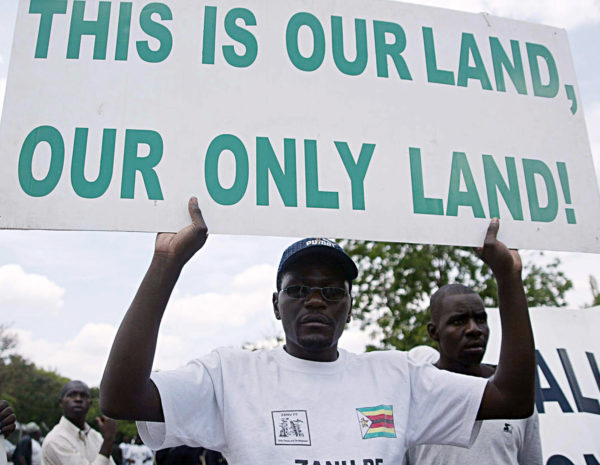
Members of Robert Mugabe’s ruling Zimbabwe African National Union-Patriotic Front party (ZANU PF) gather in the streets of Harare, 09 November 2006, in support of the issuing of the 120 99-year leases to new farmers by Zimbabwe’s President Robert Mugabe. Mugabe doled out long-term leases 09 November to land which had been confiscated from white farmers, warning the former owners not to expect government compensation. Senior government officials along with five white farmers were among the recipients of the 120 99-year leases presented by the veteran president at a ceremony in an international conference centre in downtown Harare.
AFP PHOTO / Desmond Kwande / AFP PHOTO / DESMOND KWANDE (Photo credit should read DESMOND KWANDE/AFP/Getty Images)
Long before controversial leader Robert Mugabe’s forced resignation in mid-November, nearly a century before the landlocked southern African nation was known by its current name, two oft-repeated quotes by a pair of powerful men came to symbolize the ongoing struggle for the naturally abundant region we now know as Zimbabwe. The first came from Lobengula, the Ndebele ruler of the Matabele kingdom encompassing current-day Zimbabwe, upon realizing he was duped into signing over his sizable kingdom to British mining magnate Cecil Rhodes under the pretense of an established friendship and British protection from other resource-thirsty nations clamoring to exploit the area. “The chameleon gets behind the fly, remains motionless for some time, then he advances very slowly and gently, first putting forward one leg and then another,” offered a dismayed Lobengula, in 1888. “At last, when well within reach, he darts his tongue and the fly disappears. England is the chameleon and I am that fly.”
The second offering came from Rhodes himself. “The British happen to be the best people in the world, with the highest ideals of decency and justice and liberty and peace, and the more of the world we inhabit, the better it is for humanity.”
Both of these profound 19th century quotes, and the many battles, economic and political machinations that have since ensued, were anchored in one essential asset: land. Consistently, just before Christmas, the new Emmerson Mnangagwa administration granted an early gift to a white farmer by allowing him to reclaim the land he was evicted from seven months ago by associates of the Mugabe administration. A week earlier, after the government ordered “illegal occupiers” of farms to vacate the land immediately, Zimbabwean deputy finance minister traveled to neighboring Zambia to meet with former white farmers who settled there since being similarly removed under the previous administration. And the Commercial Farmers Union, largely composed of white former farmers, is meeting with the lands minister to discuss its options. “I am advising our members to be patient and give it time,” reported union vice president Peter Steyl, to The Associated Press. “But I do see many of them going back into farming,”
Mugabe’s Fast-Track Land Reform Program of 2000 resulted in the transfer of over 19 million acres of land from large white-owned farms to nearly 170,000 black households over an 11-year period. So it’s not hard to imagine these Mnangagwa administration moves as early signals to the ever-watchful West that Zimbabwe is, once again, open for business and its large tracts of fertile and resource-rich land back in play.
“I wouldn’t be surprised if leaders of the new administration have met with international and Western leaders to assure them that Zimbabwe is a safe destination for business,” said Freedom Mazwi, a research fellow with the Sam Moyo African Institute for Agrarian Studies (SMAIAS) in the Zimbabwean capital of Harare. The Ph.D. candidate‘s research is focused on the reconfiguration of agrarian capital and markets, particularly in Africa. “One way of showing this will be by way of guaranteeing the security of tenure in the agricultural sector,” said Mazwi, noting that “years of international isolation have pushed Zimbabwe to rethink its policy of radicalization in favor of reengagement with international financiers and Western investors.”
Such investment quickly dried up upon Mugabe’s controversial land reforms as an outraged, Western-led international community imposed sanctions on its former ally. Of the 4500 white farmers in the country before then, only a few hundred remain today. Yet, prior to these reforms Western nations had no problem investing heavily into a country where this small group of a few thousand white farmers and their families before them had through violence and deception, come to possess half of the country’s land, leaving millions of Black Zimbabweans to overcrowded, less fertile acreage.
“The British Colonial rule and, later on, the white Rhodesian Government had shaped Zimbabwe as one of the most inequitable political regimes based on the exploitation and the discrimination of the Black majority,” said Frédéric Mousseau, policy director for the Oakland Institute, an independent think tank on international policy. Mousseau, who conducted several research missions in the 2000s to investigate the crisis in Zimbabwe —formerly known as Rhodesia in honor of Cecil Rhodes — reported, “The white minority had seized control of the vast majority of good agricultural land.”
Despite his initial overtures to the white farming minority, Mnangagwa has clearly maintained since his inaugural address that he will not completely reverse the results of the land redistribution program under Mugabe. “Dispossession of our ancestral land was the fundamental reason for waging the liberation struggle,” said Mnangagwa in his November address, citing the 15-year war for liberation that brought about the country’s independence. “It would be a betrayal of the brave men and women who sacrificed their lives in our liberation struggle if we were to reverse the gains we have made in reclaiming our land.” The new leader, who has promised to undo some land reforms, did go on to say, “My government is committed to compensating those farmers from whom land was taken in terms of the laws of the land.”
However, the stakes run higher than any claims imposed upon modern-day Zimbabwe by its colonial holdovers. “The new administration has to clearly enunciate its policy on land and how it intends to rehabilitate the white farmers,” stressed Mazwi. “The policy can only be welcome if it is not going to displace the more than 170,000 resettled [Black] farmers and also if it is to target the larger sized farms which are not being fully utilized.”
In Zimbabwe, it’s always been about the land. The Lippert Concession of 1889, granted by Lobengula to the Boers in a backfired attempt to undo Rhodes’ deception and British encroachment, enabled the British South African Company a foothold in the region for a massive land expropriation and extraction of natural resources at the expense of indigenous populations. A decade later, after successfully suppressing uprisings with advanced weaponry, an increasing population of white settlers ordered the institution of “Native Reserves” and violently herded millions of Black Africans into lower quality land reservations or “communal areas,” guaranteeing the lion’s share of fertile land and resources for themselves. This brutal seizure of indigenous land and cattle would accelerate and upon the Land Apportionment Act of 1930, which codified this inequitable segregation of land between the races, 50,000 white settlers controlled over 49 million acres of land while 1.1 million Africans were confined to 29 million acres of Native Reserves.
“The regime also made sure that the Black population remained a cheap and readily available labor force for mines and plantations,” said Mousseau, explaining the reserves were established on marginal land where Africans “could hardly make their living on subsistence agriculture and had therefore to rely on out-farm work.” Attempts at self-help and development by the Black population, he continued, were systematically countered by such laws as the Maize Control Act 1934 and the Land Husbandry Act 1951, restricting African “access to cash cropping, which would have competed with white farmers‘ production and reduced people’s dependence.”
This skewed relationship existed for a half century amidst mounting tensions until a combination of boycotts, international pressure and the 15-year war for liberation forced the British-backed Rhodesians to the negotiating table at Lancaster House in London with the Patriotic Front, a coalition of the Zimbabwe African Peoples Union (ZAPU) and Zimbabwe African National Union (ZANU). These hard-fought negotiations would bring about the independence elections of 1980, the international recognition of Zimbabwe, and a “willing seller, willing buyer” resettlement agreement that protected white-occupied land, only making it available for purchase and resettlement if its occupants agreed.
As head of ZANU and the primary negotiator for independence, Mugabe, now an international hero, won the elections and was named prime minister. However, over the next decade and a half while aligned with the West, his popularity dwindled as land reforms fell far short of mass demands, wealth was further consolidated in the hands of a few, and access to education, health care, employment and social services slumped. By the late 1990s, economic turmoil and mass political unrest posed a serious threat to the regime as Zimbabweans protested, engaged in labor strikes, and occupied lands without government consent. Consequently, in 2000, Mugabe’s land reforms were put into motion, removing thousands of white occupants and turning the former international hero into a Western pariah.
Mazwi clarified the former leader had little room to do anything else given a popular land reclamation had been underway for almost a decade without his signature. Simultaneously, Mugabe recognized he could best salvage his uncertain political position by now championing the volatile issue. “The land reform came from the war veterans and thousands of peasant farmers who started occupying land in the early 1990s, and President Mugabe and his government were forced to accept the demands from the landless,” stressed Mazwi. “It was not a Mugabe initiative, and he had no option but to facilitate the radical land reform given that the willing buyer, willing seller framework had dismally failed to redistribute land.” He further pointed out that that the land reform was carried out at a time when political tensions were high, a credible opposition threat to Mugabe had emerged, and “the decision by white agrarian capital to side with the opposition did not help any matters.”
Mousseau echoed this analysis. “It became clear in the 1990s that giving land back to Black farmers was necessary to fight hunger and poverty in Zimbabwe,” he offered, clarifying that “even the World Bank recognized that land redistribution was critical to alleviate poverty” and spur economic development. However, said Mousseau, “rich countries rejected the government’s requests for support for a smooth reform in the 1990s, which led the government of Mugabe to confiscate land in the early 2000s for redistribution” and, in turn, that was “met with anger by several Western governments who took punitive measures including economic sanctions and cutting down development aid to the country.”
“Zimbabwe’s case is a prominent example where global hegemonic forces have coalesced to suffocate the economy in an attempt to reverse the land reform,” said Mazwi, noting it “has also served as a clear warning for other countries, such as South Africa, not to undertake such a radicalized path when undertaking land reform.”
Consistently, the West has spent much ink characterizing Mugabe’s reforms as a “failed” program with little impact on Zimbabwe’s Black farmers. CNN recently alleged the program “crippled the economy” with little to no substantiation, especially given the prior economic crisis of 1998 and its sourcing in a decade and a half of Western “structural adjustments” aimed at maximizing and extracting investment revenues while minimizing customary land claims, regulation and sustainability. And while much press has justifiably been devoted to criticizing Mugabe for giving his allies a reported 40 percent of the land seized from white farmers, it has conveniently neglected to further analyze what happened with the remaining 60 percent.
If one focuses on the legacy of the land reforms itself, other than that of Mugabe, the picture becomes more nuanced. Mazwi cited extensive research by SMAIAS showing that “the majority of small-scale farmers depending on the agro-ecological region have been able to productively utilize their land even under an extremely difficult economic environment.”
“Lacking resources, technical skills and adequate support, the Black farmers who resettled in these farms were initially often not able to restore the previous levels of production,” said Mousseau, noting that “Western sanctions to punish Mugabe for the reform combined with the drop in agricultural production” to contribute to the economic turmoil, hyperinflation and rampant unemployment faced by the country in the early 2000s. However, ten years later, said Mousseau, “development experts recognized the reform as a success, having transferred the land occupied by some 4,000 white farmers to over one million black Zimbabweans who had restored agricultural production and improved their livelihoods.”
Mousseau cited a November 2010 study that documents this success and dispels the failure myth so readily advanced by the West. Upon providing a list of agricultural indicators where these oft-criticized reforms have had substantial success, the study’s lead author, Professor Ian Scoones offered, “If the new resettlements are to contribute not only to local livelihoods, but also national food security and broader economic development, they unquestionably require external investment and support, just as was done from the 1950s for white agriculture.”
Scoones sobering prescription looks well beyond the legacy of one corrupt former leader to speak to the much larger legacy of the land itself and the racial inequities that have continued to plague it since its brutal colonial occupation. In an era where similar Western forces are increasingly displacing indigenous populations worldwide, it remains to be seen how far the Mnangagwa administration will go to reverse African resettlement in a resource-rich land once ceded to a deceptive chameleon by an unwitting fly.
“Land is an important resource not only in Zimbabwe but in the whole of Africa,” said Mazwi, stressing “the essence of the liberation struggle against colonialism was basically to reclaim the land.” Had all parties, continued Mazwi, “been sincere at the Lancaster House Conference in 1980, which gave birth to Zimbabwe, the country would not have gone through all this pain to resolve the land imbalances.”


